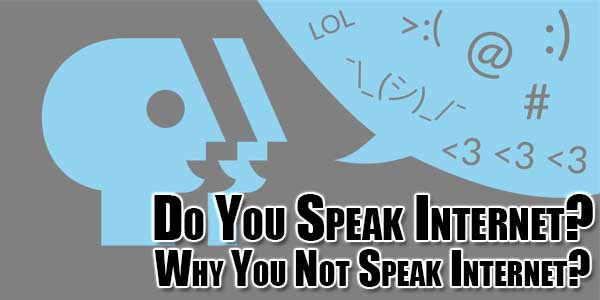
Did you know that English, in its many forms, has the biggest vocabulary of any language in the world? It’s a rich linguistic heritage that we take great pride in – then throw it all up in the air, shake it all about and use for internet communication. Do you speak internet?
It’s worth reminding ourselves that language is a living thing. From time immemorial, the way we communicate with each other it has developed and evolved under the influence of civilisation in all its multifariousness – English is no exception. Why don’t we speak like Shakespeareans now? Because our language has changed – along with just about everything else that the Internet has changed. With change comes danger, and with that – a greater requirement to protect yourself from harm. There are many ways to do this, but the safest and easiest way to do this is undoubtedly through the use of protective software, such as a virtual private network – which you can see a comparison list of here.
Table of Contents
New Technology Needs New Words:
It’s impossible to have words for something that doesn’t exist. Internet, computer, telephone – these words would have meant nothing to a 19th century English speaker. In order to communicate about, through or within a new technological framework such as the internet, language inevitably has to adapt.
From blogging to trolling, taking selfies to using apps, retweeting to unfriending, new behaviours are being enabled that need fresh vocabulary. What can we do? Repurpose the old to describe the new. Thanks to the internet, we now upload our profiles and stream our music, google for information or skype each other. It’s exciting, isn’t it?
The Internet Rules:
In the absence of any linguistic guidance at the beginning of the internet revolution, the language and etiquette used online has always been user generated. There were no rules then. But to expect the language to stay static in the face of such a huge shift in communications technology would be wholly unrealistic. It couldn’t. It didn’t.
No Time To Waste:
In the fast changing world of the internet, communication has become much quicker. Long letters have given way to short emails – and even they’re in danger of being returned to sender with a curt, withering comment: TLDR (too long, didn’t read). Notes and telephone messages have morphed into mobile texting and instant messaging. With smartphones everywhere championing round-the-clock contactability, time is of the essence.

Because Internet:
The inevitable result is a relaxation of whatever rules there were. Spelling, grammar, syntax and punctuation are all losing their authority, playing second fiddle to the now overriding interest of simply getting the message across as succinctly and fast as possible.
There, they’re, their – who cares about the grammar when you know what I mean – or should that be: u no wot I mean. Compounded by social media platforms such as Twitter where communication has to be shoehorned into a messages of max. 140 characters, it’s understandable that corners will be cut. Why? Because internet.
Abbreviations:
FYI (for your information), abbreviations and acronyms are flourishing as a shortcut to getting to the point. AFAIK (as far as I know), many of their origins can be found in the early days of mobile phone texting when ‘r u feeling ok’ might be answered with ‘im gr8’. However, the language of the internet has evolved to such an extent since then that OMG (Oh My God), LOL (laughing out loud), TBH (to be honest), WTF (what the f*ck) and so on are now considered part of the mainstream, and YOLO (you only live once) has become a slogan for a whole generation!
Totes Emosh:
Online communication is largely written, and much of it is informally written personal content – so how do you convey all the nuances of human emotion with nothing but a standard 104-key computer keyboard?
This is where it gets creative. Happiness, sadness, anger, fear, surprise and disgust are generally agreed to be the 6 basic human emotions. Then again, according to Facebook’s latest ‘reactions’, they might as well be: Like, Love, Haha, Wow, Sad, Angry. Welcome to the age of emojis. And memes.
Other ways to add oomph to your messages could be the clever use of punctuation. Intrigued? Excited?? On the edge of your seat??????? And to indicate a raised eyebrow as a sign of surprise or scepticism, why not use an ellipsis in your narrative…
The ultimate emotional message must be the keyboard smash, a pure expression of deep anguish of frustration that the writer has taken out on the keyboard in front of him: Asdlkfjahsdlkfjhaw!!!!!!! U feel me?














Thanks for this great article, I really enjoyed it from beginning to ending because this is very interesting.
Welcome here and thanks for reading our article and sharing your view.